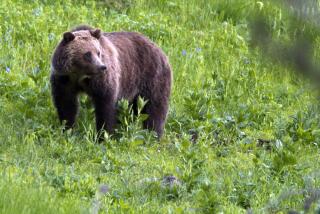‘Things look pretty bleak for the polar bear’
- Share via
Polar bears are likely to lose out to grizzly bears in fierce competition for food as climate change drives the two species into shared habitat, biologists have concluded.
A study released Tuesday was based on 3-D computer modeling that compared the skull and jaw strength of the two bruins and found polar bears ill-suited to the tougher chewing demands posed by the largely vegetarian diet of their grizzly cousins.
The study, funded by the National Science Foundation, was conducted by evolutionary biologists at UCLA and published in an online journal of the Public Library of Science.
The findings add to mounting signs of threats to polar bears from global warming that scientists attribute to excessive levels of carbon dioxide and other heat-trapping “greenhouse gases” emitted by human activities, such as the burning of fossil fuels.
“This is one additional piece of evidence that things look pretty bleak for the polar bear, if current trends continue,” said Graham Slater, lead author of the report.
Polar bears already are losing habitat as rising Arctic temperatures diminish the sea ice they depend on to hunt for seals. As the ice continues to shrink, polar bears will be forced to seek additional food sources.
“To people who say polar bears can just change their diet, we are saying … they will have to, but it probably will not be sufficient for them, especially if they are co-existing with grizzly bears,” said Blair Van Valkenburgh, senior author of the report.
Grizzlies, a subspecies of brown bears, have begun moving northward in Canada as their natural habitat grows milder, while polar bears are being pushed farther south by melting ice, putting the two species together in territory best suited to the grizzly.
“These two species are already starting to come into contact,” Slater said. And in the escalating competition for the plant life that makes up the bulk of the grizzly’s diet, the polar bear is expected to lose.
The problem for polar bears is that they lack the ideal skull strength and tooth size needed for munching plants, grass, tree bark and berries, the scientists said.
Analyzing the biomechanics of their skulls reveals “polar bears would not be able to break up the food as well in their mouths and would not digest it as well,” Van Valkenburgh said. Seal blubber is softer and requires less chewing, putting less strain on the skull by comparison.
Polar bears evolved from the brown bear relatively recently, and the two are closely related, with the split between them occurring 500,000 to 800,000 years ago in response to the rapid onset of glacial climates during the ice ages.
Polar bears are a “marvelous example of rapid adaptation to an extreme environment,” Slater said. “The fact that we can lose them equally as rapidly as a result of human-mediated climate change is rather striking.”
More to Read
Sign up for Essential California
The most important California stories and recommendations in your inbox every morning.
You may occasionally receive promotional content from the Los Angeles Times.










